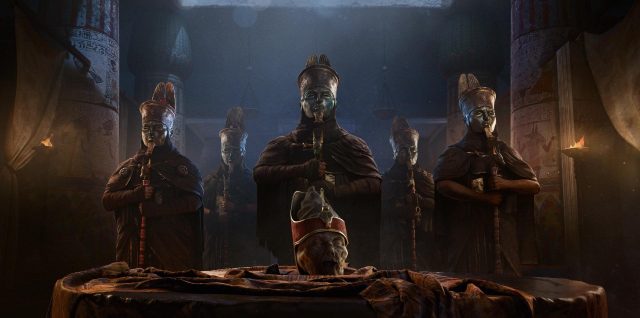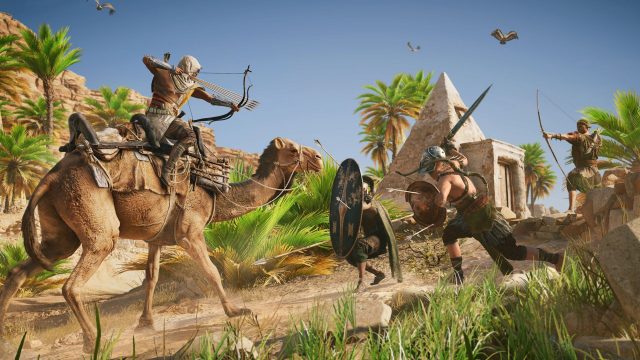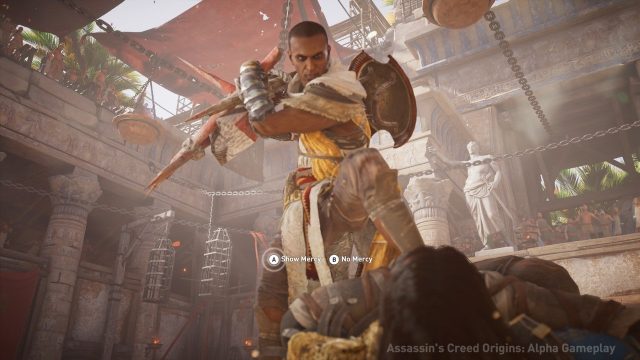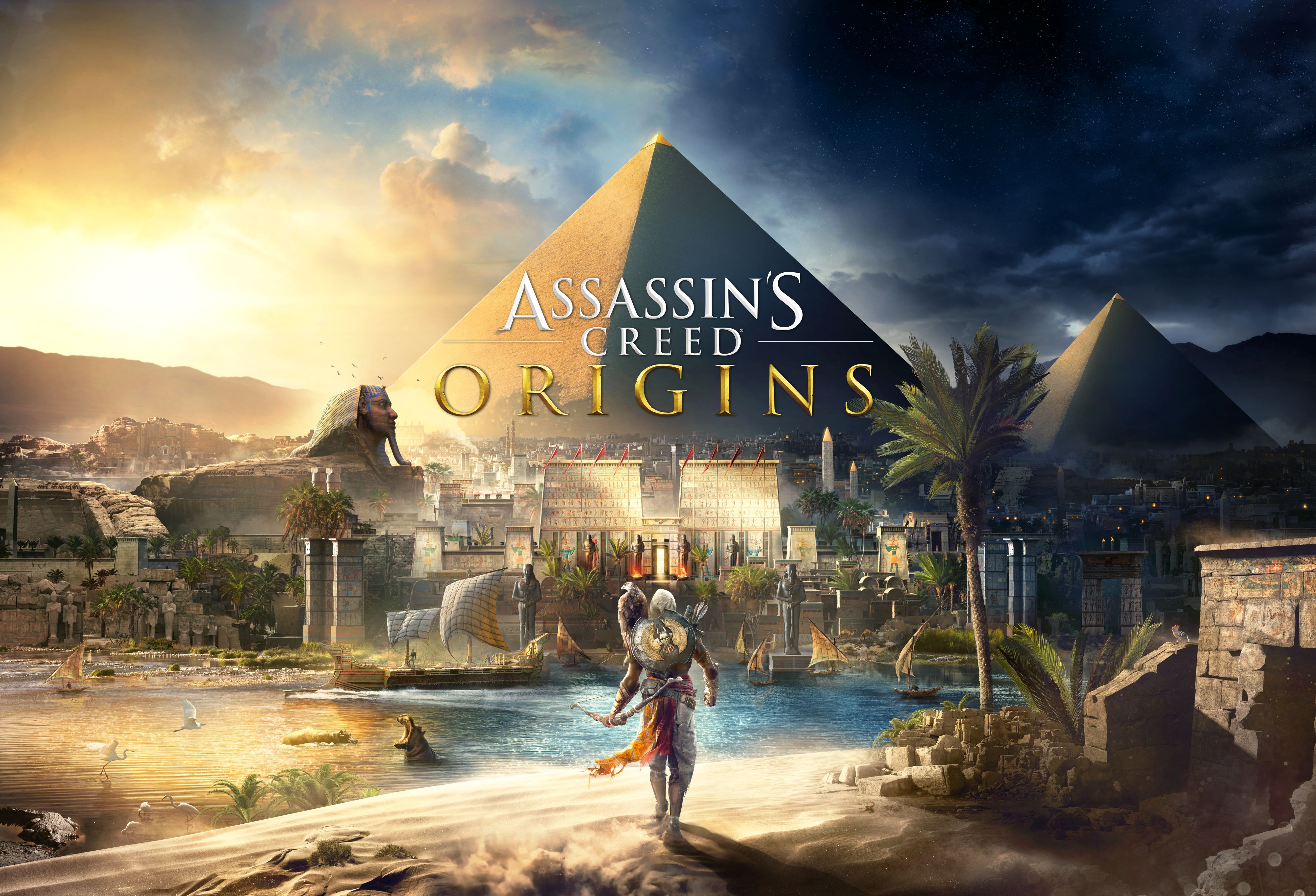
Sometimes taking a break can be a good thing. After all, you can’t go full bore forever, nor can you continue to release similar games each year without creating at least some fatigue within your audience. Creativity and quality also tend to suffer when this happens, with few ever being able to escape or buck this familiar trend that persists throughout pop culture.
This was the case with Ubisoft’s venerable and historically fueled Assassin’s Creed series, as becoming an annual release machine led to it suffering, in terms of both quality and creativity. After hitting a perceived wall, and noticing that its fan base was starting to get fatigued, those who oversee it decided to do something that they hadn’t done before: take a year off. Thus, following the release of Assassin’s Creed: Syndicate, two years passed before the industry got to become its next assassin.
Following this planned hiatus, the series is back and ready for action with Assassin’s Creed: Origins. With a new setting, unique, animal themed targets and a brand new assassin, it aims to stand out and correct the things that were holding its most recent predecessors back. And, for the most part, it does, but some familiar trends seep back in and a few rather unfortunate technical issues mar what is otherwise a very good game.
Origins is the story of Bayek and his wife Aya; two Egyptians who hail from the small, country village of Siwa. Sworn protectors, they act as Medjays for their region, though it’s an honour that extends to the whole of Egypt, all of which they hope to aid. They find themselves living in a troubled time, and end up suffering a terribly personal loss at the hands of a shadow organization that seeks entry into Siwa’s hidden tomb. That is, the loss of their young and jubilant son, who’s murdered right in front of their eyes by people wearing fancy and ornate masks.

At its core, this narrative is about revenge, but there’s so much more to it. While Bayek wants to get back at those who took what he cherished most, he and Aya both note that more needs to be done. Egypt is in turmoil, and those who attempt to control and suppress it are hurting the people with their nefarious schemes. Ones that include poisoning civilians, harming animal gods and murdering the innocent, among other things. As such, Bayek and his love adopt the goal of aiding the country, while they also fight to uncover those who were behind their son’s assassination. All this while dealing with political intrigue surrounding Cleopatra’s goal of becoming queen.
Things excel whenever emotion comes into play, as while Origins does play out similarly to other Assassin’s Creed games — what with you needing to assassinate the megalomaniacs who seek to control the people in evil ways — it brings a lot more heart to the table. Bayek’s struggle is real, as what happened to both he and Aya has affected them significantly, in ways that players get to experience firsthand. Not only is their relationship now strained, but dreams of their beloved late son flood their minds and factor into the narrative as well. Simply put, this is a game that will tug on your heart strings more than once, amidst its many bloody conflicts and brutal assassinations.
This twenty-five to thirty hour campaign consists of approximately twenty different missions, and while this figure may sound low, it doesn’t feel that way at all. Why? Well, this time around Assassin’s Creed: Origins takes a slightly different form than that of its predecessors, and is now more of an RPG than ever before. Thus, players must earn experience points in order to both increase Bayek’s level and upgrade his skills. This is done, for the most part, by completing many of the detailed side quests that litter the gigantic map.
For the most part, these side quests are both more intricate and more meaningful than ever before. While some boil down to the same thing (saving somebody from a bandit camp, before having to carry them to safety, for example) others offer a lot more than just that. Through them, you’ll be running, riding and swimming throughout this massive take on Ancient Egypt, all while doing the good deed of helping people. Lots may ask for you to save their kin, but others will require other things of you, including assassinating greedy tax men, stealing ancient relics, finding hidden tombs and stalking strange folk who happen to be up to no good. Conversely, they may ask you to help save the local wildlife from poachers, or aid their region’s animal god who’s fallen sick under questionable terms.

This system isn’t new, nor is it revolutionary in any way, but it works pretty well within Assassin’s Creed: Origins. Those who take their time are rewarded, as are those who scour the landscape for hidden locations, and almost every side objective has weight behind it. The result is a system where one must complete lots of side content in order to increase Bayek’s level (and skills) enough to be able to tackle the next story mission on fair terms.
The downside to this system is that it turns the game into somewhat of a grind, especially later on, as Origins nears the conclusion of its story.
At the end of the game, players are asked to be close to level 35, else they risk not having a chance against those with whom they’ll do battle. On paper, this sounds fine, but when the final mission jumps from level 32 to level 35, it ends up creating frustration. Those who want to see the story through will become annoyed at having been teased about the end, just to find themselves faced with having to tackle more side quests. It’s exactly how I felt when I thought I was going to be able to conclude Bayek’s story, and discovered that I’d need to spend two or three hours leveling up through side content before I’d be able to tackle it, after already having completed close to 50 side quests.
This isn’t me saying that I absolutely hate the game’s new structure, or that I wish the leveling system wasn’t there. It’s just frustration from someone who’d taken their time and wanted to see the conclusion of the story without having to grind any more. My plan is to continue to play Origins, now that I’ve beaten it, as there’s still lots I want to see and do before I’ll consider myself done with the game. I simply didn’t want to be forced into doing even more grinding at that time.
As is always the case with Assassin’s Creed, combat comes in two different forms: stealth and confrontational. Of course, being quiet and sneaking up on one’s enemies has always offered the upper hand, and that continues to be the case here, what with stealth assassinations and surprise attacks against those who can’t be silenced with just one poke of the hidden blade. This isn’t always an option, though, as you’ll often find yourself in the midst of open combat against multiple enemies, or predators like crocodiles and hippos.

Here, combat allows for both offensive and defensive maneuvers, with shields making up part of Bayek’s equipped gear. One can block a foe’s attack, and can also parry, but that never really clicked with me. Instead, I focused more on rolling away from attacks, then countering with a heavy attack from my chosen blade or hammer. It can be easy to spam multiple heavy attacks together, and even kill certain enemies quickly by doing just this. Others take a bit more strategy, and can hit harder, but that’s nothing that Bayek’s trusty fire bombs can’t handle.
Truth be told, while the combat is different and better in some ways, it gets to be repetitive and isn’t all that it could’ve been. It’s fine, decent and solid overall, but is simply nothing special. And the truth of the matter is that it’s easy to exploit.
Say you’re up against bad odds, with a group of heavily shielded foes coming your way. You’ve hunkered down inside of a hut, and don’t know if you’ll ever survive. The easy way to get through such an encounter is to simply start spamming your fire bombs, because they can turn the tide of battle with ease. Throw a few, then sit back and watch as those powerful, shielded enemies burn to death over the course of the next twenty to thirty seconds. Then, if any remain, use your bow to pick them off while avoiding their shields.
Bayek’s arsenal is perhaps too overpowered at this point in time, especially those bombs. His bow’s damage is at least more dependent on where you’ve aimed, and how much armor said enemy is wearing. This doesn’t mean that combat is always simple, however, as many enemies will hit hard and take lots of health away in the process, especially if they’re of a higher level than you. It’s also very easy to get surrounded by multiple baddies, at which time you’ll come to the realization that this combat system is at its best when things are one on one.

Another ability that can turn the tide of battle is Bayek’s overpower attack, which is different depending on which type of weapon your have equipped. Some have overpowered attacks that are simply powerful stabs that can render enemies dead with one quick plunge of the knife. Others, then, will offer you something more fun and visceral; that being the chance to slow time and use your enemies’ resulting sluggishness to your advantage. This one was a lot more fun, and usually allowed for additional damage to be dealt, especially since it wasn’t just focused on one particular foe. Since it’s timed, it allows for attacks on more than one enemy, even if one of those asshats ends up dead in the process.
One of Origins‘ character upgrade paths focuses on overpower, and allows for certain perks to be equipped. This includes being able to enter each battle with a half full (or even completely full, as is the case of a more elusive upgrade) overpower meter. Damage can also be increased, as can the time spent in overpower, which is definitely helpful.
Bayek can also use mounts to his advantage, and can opt for either a camel or a horse. Hitting an enemy while on horseback allows for a good deal of damage to be done, especially if it’s done with speed. Understandably, damage dealt from atop a mount is always dependent on the amount of speed you have going.
Mounts are, of course, the best way to get across large distances, and Egypt’s great size will have you doing that a lot. Granted, as you move around this humongous map, you’ll often become sidetracked upon finding new fast travel spots to unlock, or simply coming across more side missions. This land is filled with little towns and villages, which complement its large cities, like Alexandria.
Small towns are generally where you’ll find people needing help with protecting their farms or saving their family members from bandit caves, whereas larger cities aren’t as farm heavy with their side quests. Cities can also offer unique engagements, like a Roman gladiator coliseum and Ben-Hur style chariot races, which take place inside the hippodrome. To be honest, though, neither one really stands out or offers anything overly exciting, which is especially true of the races. They’re short, tough to control and more difficult than they are fun, making them an easy pass.
What’s especially neat, though, is that Bayek comes bearing an eagle companion. Senu, as he’s named, is fully playable, and can be used to find objectives, mark enemies, highlight animals and search for hidden locations. All you need to do is press up on the d-pad and you’ll then be in control of the soaring eagle.

Simply put, there’s lots to both see and do within this visually stunning land, which seems to go on and on forever (so much so that even after completing the game a lot of my map is still fogged over). There’s tons of hunting to be done, too, which is a good thing since it allows you to craft new bracers, larger quivers, more powerful chest plates and stronger hidden daggers. Hippos and crocodiles are the most vicious, but goats, cheetahs and lions can also be hunted, along with different types of birds like eagles and herons.
The map is full of hidden locations, as well, including hermit encampments, lost tombs, and the like. One could easily spend quite a few hours looking for and visiting these areas, but those who go for 100% will find themselves spending lots of time completing the game’s many different bandit camps and forts. These litter the map, and are full of Roman asshats, as well as treasure boxes. To fully complete them, one must kill their captains and commanders, and must also find and take all of their different trinkets and treasures.
Hell, there are even naval battles to engage in, some of which factor into the main campaign. They’re not terribly different from those that came before, but they’re relatively fun and offer a decent change of pace.
While its campaign is twenty-five to thirty hours long, on average, Assassin’s Creed: Origins could easily take someone over one hundred hours to fully complete. There’s just so much to see and do, and the game rewards those who complete every one of its individual locations with an achievement or trophy. Given how large the map is, and how lots of it is locked until post game, you can understand just how much there really is to do. That’s not to say that it isn’t repetitive, though, because repetition does tend to seep in even as the campaign nears its end. The grind mentioned above certainly doesn’t help, and is the leading cause of this, but Assassin’s Creed has always been kind of repetitive, which is one of the main reasons as to why it suffered as a yearly release.

On the presentation side of things, this is an impressive, albeit flawed, effort. Egypt is absolutely stunning, and it’s hard not to gawk at as you ride by its many lakes, rivers, sand dunes and pyramids. Despite being a region known for its massive deserts and copious amounts of sand, the world is thriving and is full of both water and foliage as real life Ancient Egypt likely was. Thus, amidst the golden hues of sand and desert construction resides lots of blues and greens.
The world truly feels alive thanks to the above, as well as its many talkative NPCs. Great sound effects and some impressive voice acting also aid this cause.
Things are not perfect, however, as Assassin’s Creed: Origins suffers from some occasional technical issues. Momentary freezes (a couple of which made it seem like the game was going to completely lock up) are the most notable, but texture pop-in and some lacking facial animations also mar the experience a bit. We also experienced one crash, and encountered several occasions where Bayek became stuck, or glitched and started to rotate while sitting atop a wall or fence.
Ubisoft also deserves some flack for including micro-transactions that entice players to spend real world money on in-game items. Innocent things like rare weapons and shields are available in great supply, but so are nefarious time savers. This type of practice casts an ugly shadow over the industry, and is hurting gaming.
Overall, though, Assassin’s Creed: Origins is reason to celebrate. Not only is it beautiful, thriving and massive, but it’s also endearing and entertaining. Sure, it has some issues and suffers from an unnecessary grind, but those things don’t keep it from being a very good game.
**This review is based on the Xbox One version of the game, which we were provided with. We played it on an Xbox One S.**

